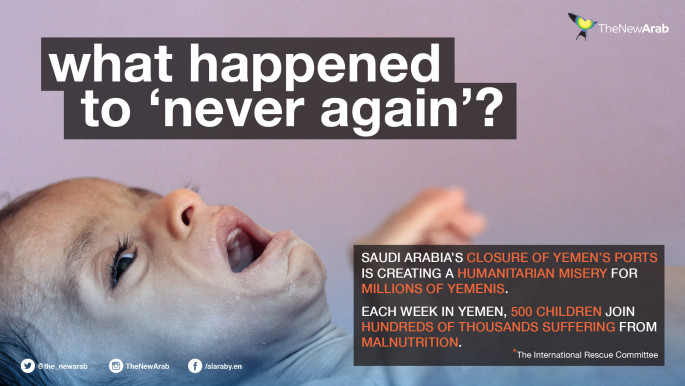'Collective punishment' in Yemen risks driving 500 children into malnutrition every week
The International Rescue Committee said on Wednesday that Saudi Arabia’s closure of Yemen’s ports as part of the fight against the Houthi rebels is creating a "humanitarian misery for millions of Yemenis."
The Saudi-led coalition tightened the blockade following an incident earlier in the month when a missile attack was fired into Saudi Arabia from Yemen.
"Sanctions and inspections should not be used as weapons of war," the New York based rights group said in a statement.
IRC slammed the international committee for its 'disgraceful' silence enabling and complicit in what could be collective punishment.
Each week, 500 children join hundreds of thousands suffering from malnutrition, added the group.
"We are far beyond the need to raise an alarm. What is happening now is a complete disgrace. Just two weeks of this blockade had a direct and dire impact in a country already battling the worst cholera outbreak in modern history and on the brink of famine," said Paolo Cernuschi, Yemen country director at the International Rescue Committee.
"What happened to 'never again'? The responsibility of failing to act to prevent collective punishment is on us all."
 |
Yemen battles one of the world's worst outbreaks of cholera, with nearly one million people infected. Some 2,200 people have died from the disease.
Saudi Arabia and its allies intervened in neighbouring Yemen in March 2015 to push back the rebels who control the capital Sanaa, in an attempt to restore the government of Abd Rabbo Mansour Hadi to power.
The UN has listed Yemen as the world's number one humanitarian crisis, with 17 million people in need of food, seven million of whom are at risk of famine.
Since 2014, the war in Yemen has killed at least 10,000 civilians.
![yemen child [Getty] yemen child [Getty]](/sites/default/files/styles/large_16_9/public/media/images/7DFEE587-3E47-490E-AD55-0FCD8E78F7C2.jpg?h=d1cb525d&itok=Tvsw0zqA)


